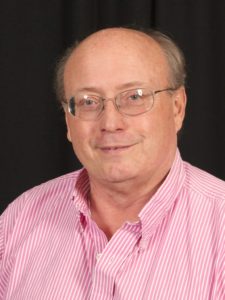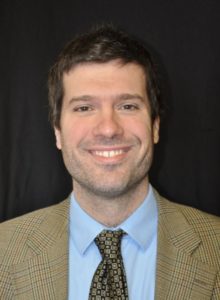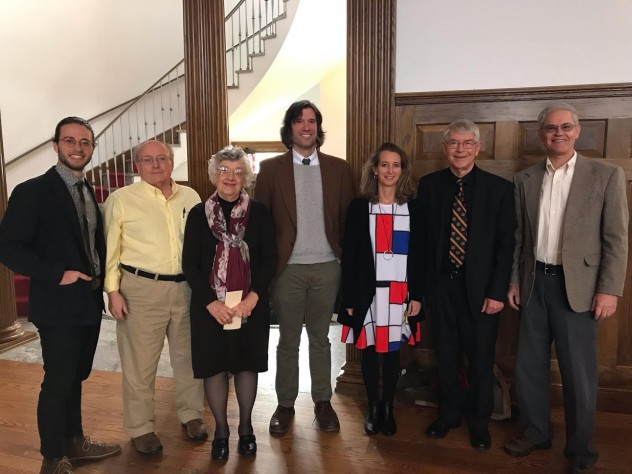Several of the humanities program’s professors, past and present, attended convocation. From left to right: Nathan Cachiaras, Dr. Tim Dillon, Rosemarie Shields, Dr. Lee Blackburn, Dr. Heather Hoover, Dr. Robert Wetzel and Dr. Jack Knowles. Photo provided by Milligan College.
Since its founding, the Humanities program has been an integral part of Milligan College’s academia. In 2019, we have the honor of celebrating the fiftieth year of the Humanities program’s establishment.
Before it was fully developed, In the academic year of 1966, a few students took an early version of humanities; C. R. Wetzel joined the Milligan faculty in 1961 and was influential in bringing humanities to Milligan. Humanities finally made its public debut with the first official class in the fall semester of 1969.
Being a required course for all students, it may come as a surprise and a relief to current students at Milligan that the Humanities program used to be a 24-hour course: three one-hour class periods and two lecture periods per week. 2008 saw the switch to the 16-hour program that we know today.
Something else that may be interesting to students is that the first lectures were in the basement of Seeger Chapel. The lectures soon moved to Hyder auditorium once it was completed in 1972 and would remain there until Gregory was completed in 2008.

Dr. Tim Dillon, a current professor of history and humanities, has had 48 years of involvement with the Humanities program both as a student and as a professor. This May will mark his 36th year teaching humanities at Milligan.

“I began teaching in 1982; I was the first humanities faculty to go through the program, graduate, and come back to Milligan to teach it,” Dillon said. “I first came to Milligan as a student back in the 70s, then Vice President LeRoy Lawson drew me to Milligan, and I have remained here ever since.”
Dr. Lee Blackburn, an associate professor of history and humanities and Director of Humanities, is one of the younger faces in the humanities faculty. He came to Milligan in 1996 as a student after hearing about it and Hhumanities via a VHS promo tape sent to him from Milligan.
“I knew I wanted to be an English/history major in college. When I came to Milligan and sat in on a humanities class, I really loved how more discussion based it was; it was right up my alley,” Blackburn said. “I went on to graduate from Milligan, went to grad school, and began teaching humanities in 2008.”
Both Dillon and Blackburn have poured themselves into the Humanities program, both as students and as professors. With that, both have fond memories of their time in humanities.
“I’ve enjoyed every year teaching humanities. There is always one person in my class that comes alive, and I enjoy seeing that. I do miss lecturing in Hyder, though. The intimacy you can achieve in there rather in Gregory is something I loved,” Dillion said.
“I have always loved the lectures in the Humanities program, particularly one done by Dr. C. R. Wetzel on Greek philosophy. The fact that we get to enter into conversations that have been going on for millennia is absolutely mind-boggling for me” said Blackburn.
“The success of humanities will always be tied to if the students are willing to put in the time wholeheartedly,” Dillon said. “As long as students devote time to studying humanities, the program will be forever successful, and students will take away more than they know.”
“Regardless of what field you go in to, if you apply yourself in humanities you will acquire skills that you will keep with you: work ethic, critical thinking, writing skills, looking at issues in broader context,” Blackburn continued, “You are a human being, faced with questions and challenged throughout your life; personal questions that the readings in humanities seem to challenge.”
As the Humanities program continues to evolve, students this next academic year can expect a change in material for the classes. Due to ‘Art Across Time’ going out of print, professors will be turning to the internet to find any artwork for class discussion; this will allow for students to better understand specific art pieces and for professors to prompt better class discussion.
No matter what it has looked like over the years, the Humanities program will continue to be an important part of Milligan’s history, and the driving force for many professors at Milligan. With the addition of a masters in humanities last year, it continues to live on as an important part of Milligan’s academia.

